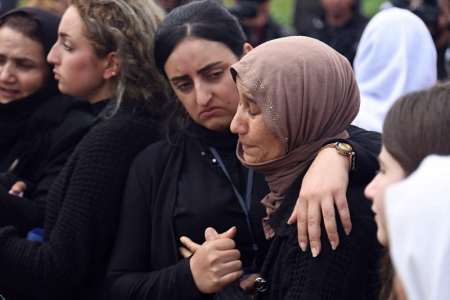
Islamic State legacy in Iraq has an enduring effect on Yazidi survivors
Two years ago, the Islamic State was defeated in Iraq. Whether it was the US-led strikes or Iranian Major-General Qassem Soleimani’s support to Iraqi forces that played a key role in defeating the militant group, it still poses a threat to Iraq’s stability.
A report written by Glenn A. Fine, principal deputy inspector general for Operation Inherent Resolve, stated that US President Donald Trump’s choice to withdraw troops from Syria and pay little attention to diplomacy in Iraq triggered the “resurgence” and “regrouping” of Islamic State (ISIS) forces in Syria and Iraq.
The report said approximately 14,000-18,000 troops are active within ISIS. That number suggests the remaining troops are to be considered responsible for recent attacks, killings and agricultural burning in Syria, Iraq and other parts of the world.
The potential comeback of ISIS raises fears, especially considering that trying to claim justice from a brutal terrorist organisation like ISIS is difficult.
In 2016, Nadia Murad, an Iraqi Yazidi once held captive by ISIS, gave a powerful and heartfelt speech to the United Nations. Speaking with a bold yet fragile tone, Murad said she wanted to “look the men who raped me in the eye and see them brought to justice.”
However, what really touched the audience was Murad’s wish that she wanted to be “the last girl in the world with a story like mine.”
Natasha Ezrow, director of the International Development Studies Programme at the University of Essex, said: “Bringing members of terrorist organisations to justice is incredibly challenging, especially when dealing with international law and a state in transition.”
To overcome this difficulty, there must be “more momentum behind trying to create more precedence and unity among international courts to punish groups and individuals,” Ezrow said in a telephone interview.
However, how does one create momentum, particularly when the target is a non-state actor?
Ezrow said: “In the past, it has not been very easy punishing non-state actors. They simply do not abide to the rules.”
Examples of non-state actors that have been difficult to punish include al-Qaeda, the Tamil Tigers, the Shining Path and Abu Sayyaf.
Ezrow stressed that “unless members of a terrorist group have been captured and they eventually try to attribute something to an individual involved, there has not been a clear template of how to punish the perpetrator of terrorism. Usually, they die.
“For example, key members who are dictating what to do are killed off. You then have underlings who are possibly members of the group or victims that have been recruited in. From this point on, it’s difficult to determine who did what. Overall, there is a lot of secrecy and denial. It’s not very straightforward.”
These circumstances are worrying, particularly for the religious minorities that were targeted by ISIS. Such minorities include Iraqi Christians and Yazidis, with women and children being the most vulnerable to kidnappings, torture, rape and being sold as sex slaves.
The potential resurgence of ISIS in areas such as Qaraqosh, Iraq’s largest Christian city, and Sinjar, a Yazidi town in Iraq directly south of Mount Sinjar, will heighten fears among inhabitants and exacerbate the mental and physical issues that the minorities — particularly rape survivors — suffer with.
A statement by an Iraqi aid worker named Yousef said an average of 1-2 Yazidi women committed suicide each day in 2015.
“These women are dealing with trauma, self-blame and cultural shame. All three components combined is a lot for these women to deal with. Being treated like cattle is going to have a negative and lifelong effect on these women,” Ezrow said.
Ezrow said suicide is still common. “The women either had enough of the daily tortures committed by ISIS or were fearful of the cultural retributions that followed after being raped,” she said.
Yazidi women having to give up children fathered by ISIS fighters touches on the cultural retribution. Until recently, Yazidi women have been torn between choosing to keep their children and reconciling with their faith and families and community members who may consider the children to be Muslims and therefore not part of the Yazidi faith or community.
Given the circumstances, one must question whether the child deserves to be with his or her mother but also face the risk of neglect or be put up for adoption and a chance at a new life.
Source: The Arab Weekly





